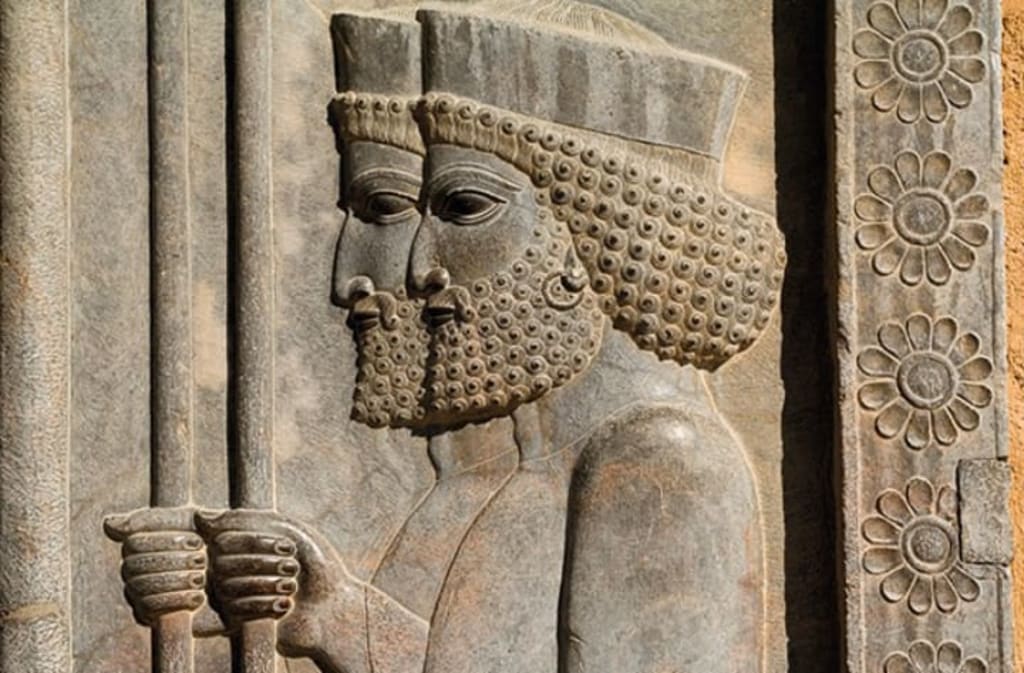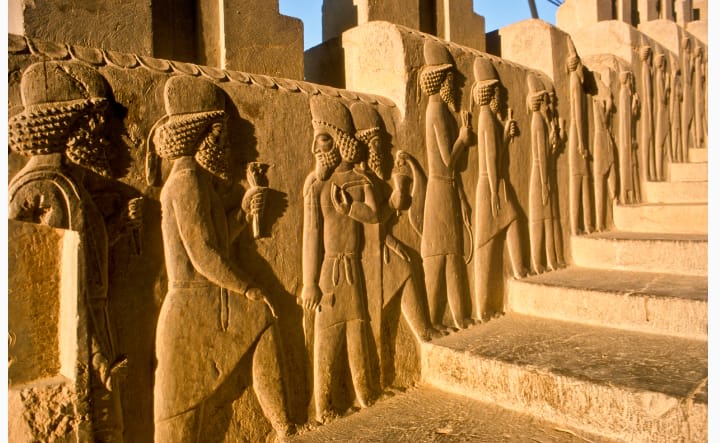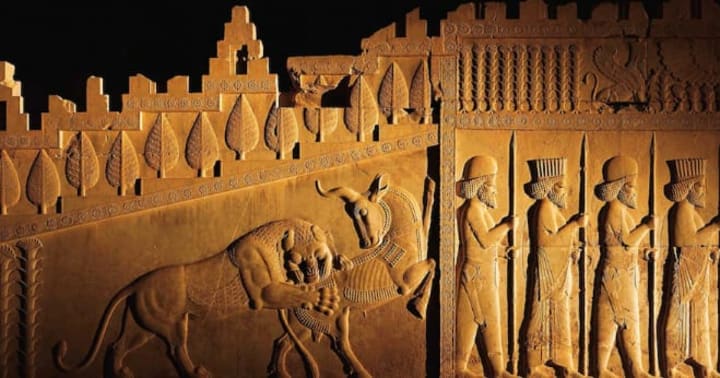
At a time when powerful kings ruled with an iron fist and wanted to expand their influence to create great empires, a newly emerging force began to gain ground in the Iranian lands the earliest accounts of the Persians are found in the Syrian writings where they are referred to as Parswa. The Persian tribes along with other peoples such as the Medians and Babylonians spent a long time under Syrian rule. However around 609 BC, these people launched a huge revolt that had such an impact that it caused the collapse of the Assyrian empire during this time the semi-legendary figure of the first Persian king called Akamenese emerged. Although not much is known about a Caimanese, he founded the Akamen in line that would rule over one of the greatest empires of the ancient world.

Among the many Persian tribes the Achaemenids were the most powerful and for many years they ruled smaller tribes and conquered more territory but they were still under the rule of the median empire by 559 bc cyrus ii better known as cyrus the great became king of persia his rise was troubled however and the presidents tell a surprising story to say the least the greek historian herodotus tells that astaya geez cyrus's grandfather ruled persia one night he had a dream in which he saw that cyrus would become ruler of all Asia fearing that he would lose his authority astayas ordered his butler to take cyrus who was still a baby to the mountains and kill him there but the butler could not find the strength to carry out this cruel task and handed the baby over to be raised by a shepherd astaiges was furious when he heard this and had the butler's son killed when cyrus was old enough he returned to his country after revealing his identity and amassing popular support he dethroned astayas and presented his claim to the throne sparing his grandfather's life in the end despite everything cyrus the great was an expansionist king and under his reign the persians conquered the capital of the mediterranean empire and ruled over an incredibly large territory, rich in natural resources but there was still an obstacle from the Mediterranean that threatened Cyrus's sovereignty.

The Greeks after the collapse of the Hittite Empire in the late bronze age Anatolia was settled by greek colonies that formed the kingdom of lydia which refused to be ruled by the persians initially the greeks attacked the persian territories believing that the greek cavalry was superior but to their surprise the persians were quite effective with their horse and camel mounted archers the persians brilliantly defeated the greeks and the kingdom of lydia was ruled by cyrus as early as 539 bc cyrus and his army besieged babylon and captured it the persians were welcomed as liberators by the babylonians who suffered from an abusive rule by king nebonidus the persians not only restored political order in babylon but also liberated the jews who were captive in the city ending the famous period of babylonian captivity thus judea became an allied kingdom of the persians and his territory served as protection against the egyptians the persians also developed a good relationship with phoenicians who were great traitors and navigators cyrus the great was also known for being a generous and benevolent king he forgave his defeated enemies and even placed them in positions in his army or government he was also known for respecting the religious beliefs of the peoples he conquered perhaps one of his most memorable acts was the abolition of slavery during his reign an act that clashed against all the customs of his time to reinforce his noble decision cyrus issued a decree that is considered the world's first human rights law the decree states i will prevent slavery and my rulers and subjects are enjoined to prohibit the exchange of men and women as slaves in their spheres of government such a tradition shall be eradicated throughout the world this decree is a bit of clay in cuneiform writing known as the cyrus cylinder in fact many peoples were happier and better off under persian rule cyrus ruled a variety of different cultures and societies in good harmony a feat unprecedented in human history earning him the title of the later shepherd king cyrus died in december 530 bc not much is known about his death but all signs are that he died from injuries sustained in a battle against nomadic equestrian tribes he is buried at pasargarde in an incredibly modest tomb for a man who commanded such a large and wealthy empire after his death the persian empire continued to expand and at its peak encompassed some 8 million square miles covering asia africa and europe the military superiority of the persians was due to their natural war-like culture in which warriors and generals were praised for their strength and bravery in battle the persians were known to have the best horses in the world they bred a breed calling which was famous for being large agile horses with fiery and aggressive temperaments perfect for the battlefield it was said that a true persian learned three things from childhood writing archery and telling the truth telling lies being dishonest or observing corruption was punishable by death in some cases those who observed truth and honor were highly respected in society the main strength of the persian army was in their archers whether on horseback or on foot they also made good use of camels as the size and smell of these animals frightened the horses of the enemy army since the persian army spans many different countries the army was composed of many peoples of different cultures including persians medians phoenicians chaldeans and even egyptians and greeks in the military ranks the elite warriors were the immortals a force of 10 000 highly trained men who served as the royal guard the immortals followed the persian model and wore colorful clothing heavy armor helmets sometimes even mass a spear with an iron tip and a counterweight on the other end they also carried bows and arrows the immortals fought in a disciplined way and never backed down from the enemy whenever warrior fell in battle he was immediately replaced by one of his fellows giving the impression that he was returning from the dead as a system of government the persians maintained many capitals a fine method to keep control over the vast territory of the empire persepolis was the most luxurious and impressive city of the empire whose edification was initiated by king darius the first the persepolis terrorists is more than 125 000 square meters and the walls of the palaces are up to 20 meters high another impressive fact about persepolis is that it was built by free laborers men and women were paid according to their role in the construction the persian religion was zoroastrianism founded by the prophet zarathustra and considered the first monotheistic religion in history zoroastrianism also includes belief in a divine paradise a hell and its demons believe in the coming of a messiah and resurrection and a final judgment in which all souls will be judged zoroastrianism exists to this day and is worshiped by some people living in iran and india in 499 bc the persian empire was already unbelievably large however with such a huge territory problems also increased especially the problems with the greek cities in macedonia thrace and lydia which led to constant revolts the greeks were always proud of their freedom and fought with all their might to defend their city-states the persian king derised the first was a great king and accomplished many things for the persian people and the nations he ruled derise the first vowed to conquer all of greece but to do so he would have to cross the black sea with his huge army this would take many months and give the greeks a chance to strengthen their defenses to solve this problem the riots applied an ingenious solution the persians assembled many ships and built a bridge that connected anatolia with europe at a place called the bosphorus strait according to herodotus de rise the first managed to cross about 70 000 or 80 000 persian soldiers in this way despite some victories in macedonia derise the first had difficulties against the greeks he planned to retreat to persia and return with more soldiers but he finally died a natural death before he could achieve his dream the one who took the throne and continued to rise his wish was his son xerxes the first the famous king xerxes was the son of kingdom rise the first with queen atosa being the grandson of cyrus the great in the biblical text of the old testament he is called by the name ahazorsas and it is known that he married esther who was of jewish origin xerxes continued the war against the greeks in a period that has gone down in history as the median wars several epic battles took place such as the battle of marathon the battle of thermopylae the battle of salamis and the battle of platya under xerxes the persians fought against king leonidas and his 300 spartans supported by another 6 000 greeks from various cities after defeating the spartans at the battle of thermopylae xerxes and his army managed to sack the powerful city of athens enraged by the stubborn resistance of the greeks xerxes ordered athens burned to the ground even though this violated persian custom to protect conquered cities and their inhabitants much of athens was destroyed including the sanctuaries the next day after appeasing his anger xerxes repented and had athens rebuilt in response to this attack the greeks assembled a large fleet of ships commanded by the athenian general the mystocles the greeks destroyed the persian ships and xerxes had to quickly retreat to his territories to avoid being trapped with his army in greece xerxes returned to persia psychologically devastated at losing so many men and the chance to conquer greece and was finally murdered in 465 bc in a political conspiracy devised by one of his ministers after the death of Xerxes the Persians gave up trying to conquer greece which probably saved much of europe from being swallowed up by the persian empire after many years of battles and turbulent successions all was not well in the empire the Egyptians who were under Persian rule revolted and many other kingdoms followed suit until 336 bc the persian empire was ruled by king darius iii however in 334 bc alexander the great left Macedonia and began his campaign conquering many territories that had previously belonged to the Persians after years of fighting king darius iii was defeated by alexander at the battle of isis and fled with his family to the city of ekbatana alexander went to mesopotamia and eventually captured the city of Persepolis although alexander was not in favor of unnecessary destruction and violence things became chaotic in the Persians cities taken by the greeks persepolis was sacked and burned down and the same happened in pasar gotti the story goes that alexander went to pasargade to visit the tomb of cyrus the great a man alexander began to admire because of the stories he was told when alexander arrived he was confused and angry to learn that cyrus's tomb had been desecrated and looted probably by persian priests he had cyrus's tomb rebuilt and punished the priests the ruler of ekbaktana betrayed king darius iii and had him assassinated which marked the end of the last of the persian kings of the caymented line although he was his enemy alexander held a grand and righteous funeral for darius iii and cruelly punished those who ordered the death of his rival although some works of popular culture portrayed the persians as bloodthirsty and cruel invaders the truth is that they were very sophisticated for their time especially in social areas and systems of government many historians agree that alexander the great did not build an empire but conquered one that the persians had established centuries before his birth whether as skilled warriors wise kings or ruthless conquerors the persians have left a precious legacy to human history.
About the Creator
Enjoyed the story? Support the Creator.
Subscribe for free to receive all their stories in your feed. You could also pledge your support or give them a one-off tip, letting them know you appreciate their work.






Comments
There are no comments for this story
Be the first to respond and start the conversation.